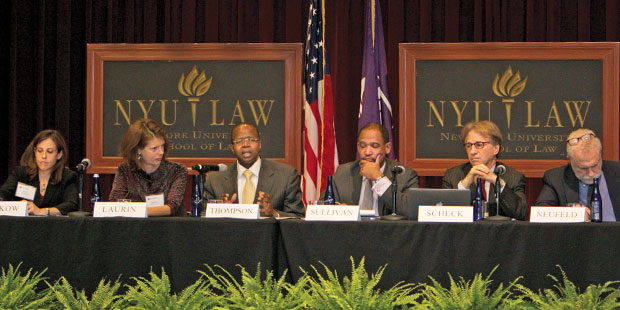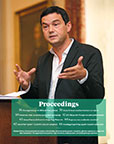A Matter of Convictions
Printer Friendly VersionWhen Kenneth Thompson ’92 took office as Brooklyn’s district attorney in January 2014, he inherited what he describes as a “staggering number” of wrongful conviction claims. (See cover story.) At the annual Law Alumni Association Fall Lecture last November, Thompson joined a panel of experts for an in-depth discussion of how the criminal justice system can address such miscarriages of justice. Moderated by Segal Family Professor of Regulatory Law and Policy Rachel Barkow, the panel also featured University of Texas Law Professor Jennifer Laurin, Innocence Project co-founders Peter Neufeld ’75 and Barry Scheck, and Harvard Law Professor Ronald Sullivan Jr.
To lead Brooklyn’s new conviction review unit, Thompson tapped Sullivan, a former staff attorney for the District of Columbia Public Defender Service. Sullivan spoke to the importance of creating a non-adversarial atmosphere between the conviction review unit and the rest of the district attorney’s office. “The people in the unit have to believe that the job of the prosecutor is about justice,” Sullivan said. “Sometimes that means putting people in jail. Sometimes that means getting people out of jail. But it’s all about justice.”
Scheck commended Thompson for bringing in a defense lawyer to help structure the conviction review unit. But Scheck also argued that in addition to overturning wrongful convictions, it’s key that prosecutors do an extensive review of the failures in the system that have led to the incarceration of the innocent. “When bad things happen in a complex system, it’s rarely a single slip-up,” Scheck said.
Wrongful convictions often stem from a systemic pattern of errors, said Laurin, whose research focuses on the regulation of criminal justice institutions. These errors include faulty witness identification, false confessions, and poor conduct on the part of prosecutors, among others.
Neufeld brought up the “3,000-pound elephant sitting in the corner”: the role of race in wrongful convictions. “It’s not a coincidence that 70 percent of our exoneration—the DNA exonerations—involve people of color,” he said. “Unlike other risk factors, we don’t have a recommendation for a remedy, but we as a nation have to come up with one.”
—


 Multimedia
Multimedia